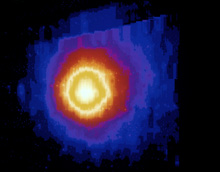January 3, 2006
Jeff Foust's - This Week in The Space Review - 2006 January 3
Good day.
I am not all that original so I have copied the list of items on Jeff
Foust's - This Week in The Space Review for January 3rd. What caught my eye
was another review of Harrison H. Schmitt's new book, "Return to the Moon".
If you don't have the book yet, then suggest you take a look at the review.
It is too long to copy so take a look at the web site and while there you
can read some of the other articles. http://www.thespacereview.com
------------------------------------------------------------
Review: Return to the Moon
---
Many astronauts have written books, principally memoirs about their
careers. Anthony Young reviews a book by Apollo moonwalker Harrison
Schmitt that instead looks to the future and the potential benefits
for returning to and utilizing the Moon.
http://www.thespacereview.com/article/522/1
------------------------------------------------------------
Let me copy just one paragraph though and we will talk more later. - LRK -
------------------------------------------------------------
snip
Helium-3 and the future of energy
Schmitt does not see our return to the Moon as economically viable without
private enterprise becoming integrally involved, and justified only if
America and its partners return to the Moon to stay. That means a permanent
base, and eventually several bases. Schmitt’s book acknowledges the need to
exploit the Moon’s resources in situ. The chief motivation in returning to
the Moon, writes Schmitt, is the potential for energy generation that is
locked within the lunar soil. Helium-3, arriving at the Moon by the solar
wind, is imbedded deep in the lunar soil as a trace, non-radioactive
isotope. Schmitt says the energy in the raw lunar soil could be unleashed
through the process of deuterium/helium-3 fusion. Small-scale fusion
experiments have been taking place at the University of Wisconsin-Madison
Fusion Technology Institute, where Schmitt is a professor. He discusses
other means of fusion processes in context. What Schmitt envisions for the
future are cargo ships returning significant quantities of lunar soil to
Earth for processing by fusion for energy generation. He goes into
considerable detail explaining the economics of making this viable.
snip
------------------------------------------------------------
-UPDATE Note - I've been informed that quantities of lunar soil is NOT what
Schmitt plans to bring to Earth, rather the processed Helium-3 itself. - LRK -
Thanks for looking up with me.
Larry Kellogg
Web Site http://lkellogg.vttoth.com/LarryRussellKellogg/
Blog Spot http://kelloggserialreports.blogspot.com/
RSS link http://kelloggserialreports.blogspot.com/atom.xml
News ltr https://news.altair.com/mailman/listinfo/lunar-update
More about the Pioneer Anomaly. - LRK -
------------------------------------------------------------
http://arxiv.org/abs/gr-qc/0512121
The Study of the Pioneer Anomaly: New Data and Objectives for New
Investigation
Authors: Slava G. Turyshev, Viktor T. Toth, Larry R. Kellogg, Eunice. L.
Lau, Kyong J. Lee
Comments: 42 pages, 40 figures, 3 tables
=============================================================
Welcome to this week's issue of The Space Review: (Jeff Foust)
The case for smaller launch vehicles in human space exploration (part 1)
---
One of the cornerstones of NASA's exploration plans is the
development of a shuttle-derived heavy-lift launch vehicle. In the
first of a two-part report, Grant Bonin makes the case for abandoning
that effort in favor of multiple launches of smaller rockets.
http://www.thespacereview.com/article/526/1
Rockets, Missiles, & Space Travel: The up-to-tomorrow story of rocket
development and space-travel prospects
---
Those who don't learn from history will probably fail economics. Sam
Dinkin argues Willy Ley's 1957 classic still has much to teach us.
http://www.thespacereview.com/article/525/1
America's new ray guns
---
While long a staple of science fiction, directed energy weapons have
yet to play a major role in warfare. Taylor Dinerman examines the
state-of-the-art in this area and the role such weapons might
eventually play in space.
http://www.thespacereview.com/article/524/1
Of myths and missiles: the truth about John F. Kennedy and the
Missile Gap
---
At the same time Americans were concerns about falling behind the
Soviet Union in the Space Race were worries about a "Missile Gap"
between the two nations. Dwayne Day digs into the historical record
to question when John F. Kennedy knew the gap really didn't exist.
http://www.thespacereview.com/article/523/1
Review: Return to the Moon
---
Many astronauts have written books, principally memoirs about their
careers. Anthony Young reviews a book by Apollo moonwalker Harrison
Schmitt that instead looks to the future and the potential benefits
for returning to and utilizing the Moon.
http://www.thespacereview.com/article/522/1
If you missed it, here's what we published in our last issue:
Forging a vision: NASA's Decadal Planning Team and the origins of the
Vision for Space Exploration
---
Long before President Bush announced the Vision for Space Exploration
nearly two years ago, NASA has been quietly working on its own ideas
for future human exploration of the solar system. Dwayne Day and
Jeff Foust outline the history of those efforts and the influence
they may have had on the creation of the VSE.
http://www.thespacereview.com/article/521/1
The politics and ethics of spending money on space exploration
---
Many people argue that money spent on NASA would be better put to use
for any number of other efforts. Eric Hedman discusses the external
and internal challenges NASA faces for funding and what the agency
should do to win a bigger slice of the budgetary pie.
http://www.thespacereview.com/article/520/1
The first orbital honeymoon: the next step in space tourism?
---
Space tourism celebrated several successes in 2005, but what is the
next step for the nascent industry? Taylor Dinerman makes the case
for an exploration of a different kind of final frontier.
http://www.thespacereview.com/article/519/1
Review: The Planets
---
Most books about the solar system are lavishly illustrated with the
latest images from Hubble and other spacecraft missions. Jeff Foust
reviews "The Planets", a book that eschews images for a more literary
approach.
http://www.thespacereview.com/article/518/1
We appreciate any feedback you may have about these articles as well as
any other questions, comments, or suggestions about The Space Review.
We're also actively soliciting articles to publish in future issues, so
if you have an article or article idea that you think would be of
interest, please email me.
Until next week,
Jeff Foust
Editor, The Space Review
jeff@thespacereview.com
=============================================================
WHAT THE MIND CAN CONCEIVE, AND BELIEVE, IT WILL ACHIEVE - LRK
=============================================================
Many folks would like to see us back on the Moon and developing its resources.
Tuesday, January 03, 2006
Subscribe to:
Post Comments (Atom)





No comments:
Post a Comment
Note: Only a member of this blog may post a comment.